
Scheelite Gemstone: Properties, Meanings, Value & More
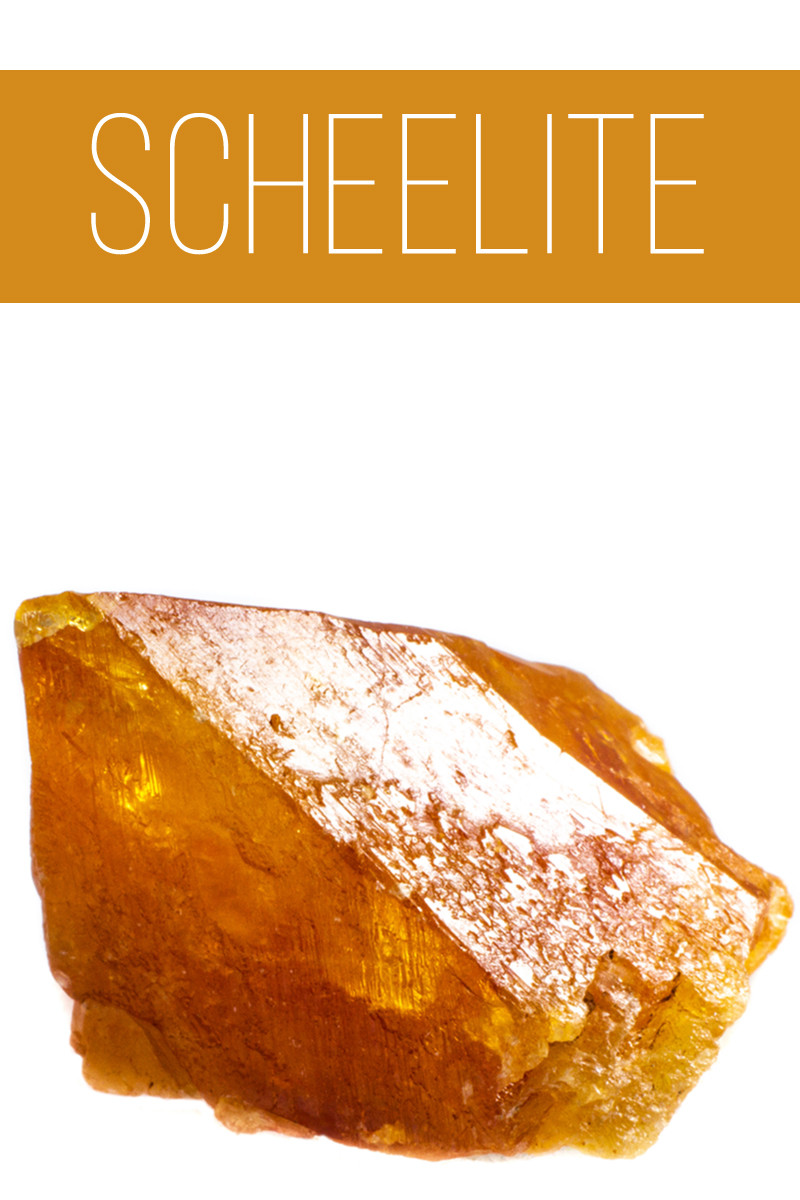 Scheelite is a unique mineral that comes in tons of colors. Is scheelite a gemstone? Yep! These gems are known for their intense sparkle and fluorescent glow.
Scheelite is a unique mineral that comes in tons of colors. Is scheelite a gemstone? Yep! These gems are known for their intense sparkle and fluorescent glow.
How common is scheelite? As a mineral, scheelite is fairly common. However, gem-quality scheelite stones, particularly faceted ones, are rare.
That said, faceted scheelite gemstones show fire and brilliance comparable to diamond, making them a sought-after collector’s item.
Want to know more? We’ll give you the breakdown on scheelite gemstone properties, prices, healing powers, and more in this guide!

About Scheelite Stone
Scheelite is a semi-precious gemstone often seen in colorless to orange or yellow hues, though its coloring varies beyond those. It’s a lucky zodiac stone for Libra.
Some alternate names for scheelite include:
Calcioscheelite
Tunstitite/Tungstite
Trimontite/Trimonite
Calciumwolframite
Tungstate of Lime
Since gems are rare, what is scheelite used for? The mineral’s primary industrial use is as a significant source of tungsten. Tungsten is an important part of electrodes, light bulbs, and high-speed steel for cutting, to name a few.
In the past, synthetic scheelite was a pretty convincing diamond simulant. That changed with the invention of cubic zirconia, which is more durable than scheelite.
Today, synthetic scheelite also has value industrially for laser technology. In gemology, the gem can even help gemologists separate Type I and Type II diamonds via its famous fluorescent scheelite glow.
Scheelite Specifications & Characteristics
Scheelite is in its own scheelite mineral group, along with wulfenite, powellite, and stolzite. While they’re all rare in gemstone form, scheelites are actually the most commonly faceted mineral in the bunch.
The mineral is a calcium tungstate with the formula CaWO4. It represents the tungsten-dominant (W) end of a mineral series with powellite, the molybdenum-dominant (Mo) end.
The easiest identification is by scheelite’s fluorescence. Most natural stones have a strong, distinguishable blue fluorescence, though it can also be white or yellow. The latter colors come with higher traces of molybdenum present.
Crystals are tabular (table-like) and dipyramidal, but scheelite can also form in granular or columnar masses.
Here are the remaining scheelite properties:
Mohs hardness: 4.5-5
Color: Colorless, white, yellow, orange, brown, gray, green, gray-blue, blue, red, violet, purple; Color-zoning may be present
Crystal structure: Tetragonal
Luster: Adamantine (diamond-like) or vitreous (glassy)
Transparency: Transparent to opaque
Refractive index: 1.91-1.93
Density: 5.90-6.3
Cleavage: Good/Distinct, 1-direction; Poor, 1-direction
Fracture: Uneven/irregular or subconchoidal
Streak: White
Luminescence: Often strong fluorescence - blue or yellow in SW-UV & X-rays, yellow in LW-UV for molybdoscheelite; Thermoluminescence (heat-inducted)
Pleochroism: Weak to unobservable
Optical Effects: Very rarely asterism and chatoyancy
Scheelite’s fluorescence may depend on which variety we’re talking about.
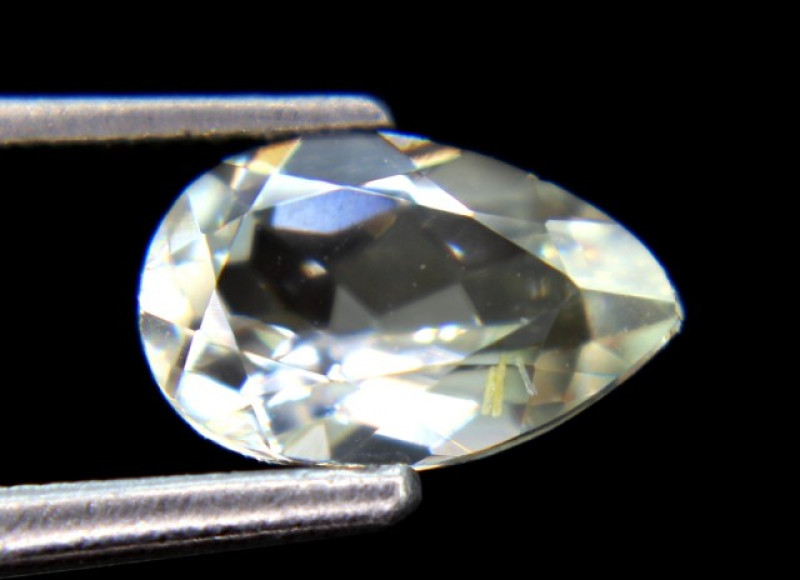
Types of Scheelite
Besides its mineral group members, scheelite also has some varieties to discuss. One is similar to powellite, one is really a misnamed type, and one is an optical delight.
Molybdoscheelite
Similar to the molybdenum-dominant powellite, molybdoscheelite is a type of scheelite that contains some molybdenum. It has whitish-yellow fluorescence in SW-UV, whereas powellite has yellow to golden-yellow fluorescence in both SW-UV and LW-UV.
Blue Scheelite (Lapis Lace Onyx)
Despite the name, blue scheelite isn’t a scheelite at all. In fact, it’s not even an onyx, despite its nickname “lapis lace onyx.” So, what is blue scheelite?
Blue scheelite is a rare Turkish crystal composed of dolomite and blue calcite, creating bands of blue, white, and sometimes yellow.
The man who discovered it thought it was scheelite because it has the same fluorescent color. Interestingly, both dolomite and calcite have a Mohs mineral hardness of 3, but blue scheelite ranks at 5.
Star & Cat’s Eye Scheelite
One rare type of scheelite displays asterism or chatoyancy. Both are optical effects where fibrous inclusions reflect light on the stone’s surface, but asterism reflects a star shape while chatoyancy reflects one ray of light, resembling a cat’s eye.
These stones come from Sri Lanka. Many sellers create imitations of these, so be wary when shopping.
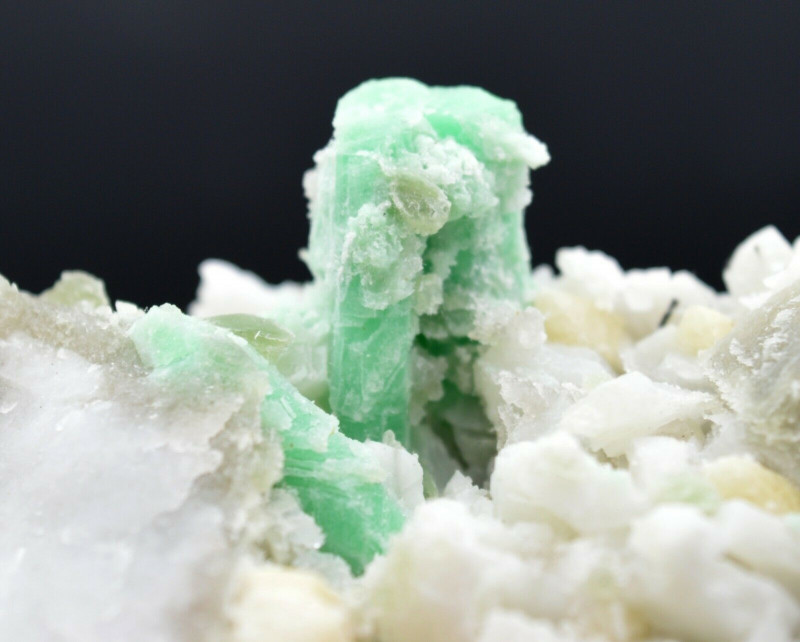
Scheelite Meaning & History
Looking at the mystical scheelite crystal meaning, this stone symbolizes determination, protection, and transformation. Blue scheelite also represents liberation of the mind and grounding.
Scheelite’s name honors Swedish chemist Carl (or Karl) Wilhelm Scheele, who discovered tungsten’s presence in scheelite during 1781. The first discovery of scheelite, however, occurred 30 years earlier during 1751 in Sweden.
The name “scheelite” wouldn’t come until 1821, when Karl Caesar von Leonhard chose it to honor Scheele. Besides proving tungsten was in scheelite, Scheele was also revolutionary for discovering chlorine and working with oxygen before anyone even knew it was an element!
Prospector Tom Farrell discovered a notable deposit in Australia in 1911. This deposit became the famous King Island scheelite mine in 1917.
Though drops in prices led the mine to close in 1920, it reopened in 1937 and saw renewed activity due to WWII, the Korean War, and the Vietnam War. It eventually closed for good in the 1990s, but the miners’ work is commemorated by the Grassy Scheelite Mine Memorial Cross.
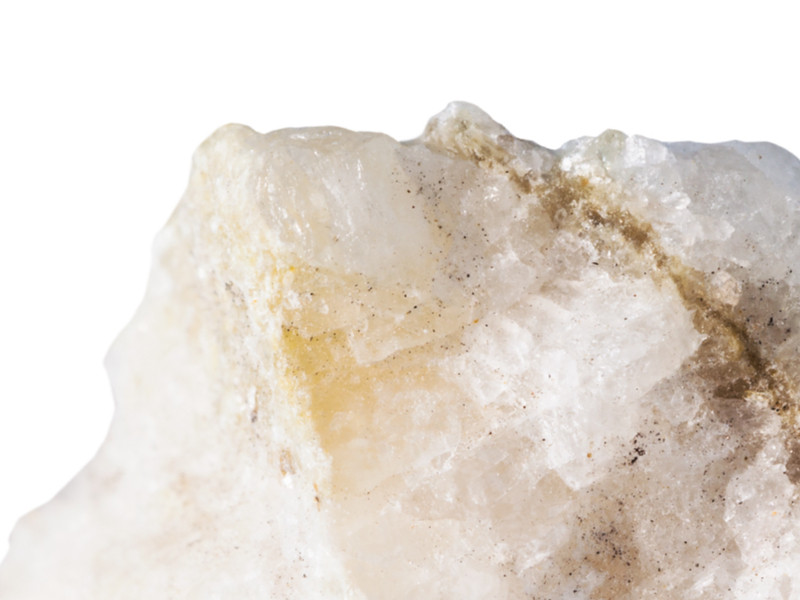
Scheelite Healing Properties
The powers of scheelite healing stones can vary by their coloring. For example, blue scheelite joins other blue gemstones with soothing benefits, while yellow scheelite evokes the optimism- and intellect-boosting benefits of yellow gemstones.
Scheelite chakra stones are unique because they harmonize the entire chakra system, from the root to the crown chakra. The stone’s physical heaviness provides the grounding element at the root, while its spiritual ties connect to the crown.
Some other healing properties of scheelite include:
Keeping you grounded
Promoting self-confidence
Boosting optimism
Balancing intellectual and emotional energies
Facilitating creative problem-solving
Dispelling negative energy
Providing greater perspective of yourself and the world
Now, what is scheelite’s value as a gemstone?
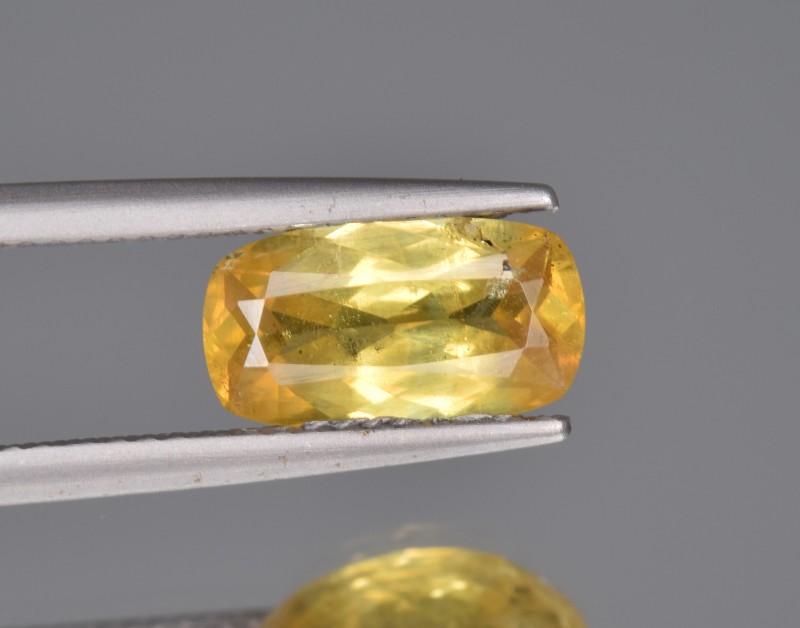
Scheelite Gemstone Properties
Scheelite’s value as a gemstone depends on standard properties of color, cut, clarity, transparency, and carat weight, along with if it’s natural or synthetic.
Color
Common colors for scheelite include yellow, orange, green, tan, or brown. Rarer and more valuable colors are colorless, white, pink, gray-blue, or purple.
The cause of each color in synthetic scheelite is which rare-earth elements (REEs) the creators use to color the stone. Colorless synthetic scheelites don’t have these elements added, however.
Cut
As mentioned, scheelite’s sparkle is incredible. Its dispersion (or fire) is 0.038, meaning just below diamond in terms of colorful sparkle. Scheelite with a sub-adamantine luster is also just below diamond. The best faceted cuts bring out these traits, such as round brilliant, cushion, or fancy cuts.
Cat’s eye or star scheelites must be cut as cabochons to display their optical effects. Blue scheelite is often carved, given its slightly higher hardness.
Clarity & Transparency
Clarity, or the amount of visible inclusions in a stone, can affect transparency. Scheelite can be transparent to opaque, and transparent specimens are much more valuable.
Natural scheelite may have inclusions in fingerprint or feather patterns, along with liquid or two-phase inclusions. Visible inclusions like these will lower value.
Synthetic scheelites, particularly those grown via the pulled method, are usually flawless clarity-wise. Some common inclusions in synthetic scheelite are rhodium or iridium, gas bubbles, and curved bands.
Carat Weight
Scheelites in large sizes are incredibly rare. Gems sold commercially are almost always small, though museum specimens can be upwards of 100 carats.
Some sources for large crystals are Peru, Korea, Mexico, and certain US states (California, Arizona, and Utah).
Synthetics
Though synthetic scheelite was once sold as a diamond simulant, this practice faded with the introduction of more durable synthetic alternatives.
Scientists grow synthetic scheelite through a few methods: flux, vapor, or pull. These stones differ from natural stones in having a slightly lower dispersion (0.026) and typically no cleavage. They also can show different fluorescent colors, like pink (in light green stones under SW-UV) or red to red-orange in LW-UV.
How do the natural scheelite stones form, though?

Scheelite Formation & Sources
Scheelite is a primary mineral, meaning it forms inside rocks as the rocks themselves form. You’ll usually see these stones in metamorphic rocks like tactite. Other common areas to find scheelite are medium- to high-temperature hydrothermal veins, granite pegmatites, or alluvial deposits.
Mining Locations
There are lots of scheelite deposits around the world, but not all produce gem-quality crystals. Many transparent scheelites with good sparkle come out of Brazil, Colorado, Austria, Italy, and Rwanda.
Sri Lanka is the only source for cat’s eye and star scheelite, while Turkey is the only source for blue scheelite. Sri Lanka also produces colorless, yellow, and gray, transparent crystals.
Other notable types of scheelite come from:
Arizona, USA — large brown crystals, occasionally transparent
California, USA — clear, transparent crystals
Utah, USA — orange crystals, sometimes partly transparent
Czechia — druzy
Italy — tan crystals
Korea — occasionally large, white or gray crystals
Romania — gray-blue to deep-blue crystals
Additional scheelite sources include:
Australia
Bolivia
Canada
Chile
China
Japan
Finland
France
Germany
Mexico
Myanmar
Namibia
Pakistan
Peru
Russia
Slovakia
Sweden
Switzerland
UK (England)
Vietnam
Finally, what is scheelite worth?

Scheelite Price & Value
When browsing scheelite for sale, you may see a broad range of prices. Most faceted scheelite gems are expensive given their rarity, but wholesale options offer more affordable prices at times.
The lowest wholesale prices for faceted scheelite are $3-$65 per carat. Usually, the gems are $230-$750 per carat.
Rough scheelite is significantly less costly, at $0.02-$1 per carat! Blue scheelite cabochons are almost always $5 to $15 per stone.
Before we wrap up, let’s discuss how to care for your gemstone!
Scheelite Care and Maintenance
Scheelite’s multiple cleavages, low hardness, and brittle tenacity make it very vulnerable to breakage and scratching when worn as jewelry. If you choose to wear it, handle it carefully and opt for scheelite jewelry with protective settings.
Keep scheelite away from harder gems and strong acids like hydrochloric acid or nitric acid. Clean it gently with a soft toothbrush, mild soap, and warm water.
Shimmer and Shine in Scheelite!
Though rare, scheelite has a luster and sparkle that competes with precious gems. This crystal can keep your feet on the ground while your mind soars with imagination, which is only amplified by this gorgeous gem’s mesmerizing appearance!
Search the Gemstone Encyclopedia
Related Auctions
Related Articles
Originally the Birthstones or gemstones were associated with a zodiac sign or the month of a individuals birth. Find out what your stone is and view the stones we have for sale
8th Feb 2021
There are dozens of quartz and chalcedony gems with various colors and patterns. Learn all about quartz properties and every type of quartz, from amethyst and agate to plasma and phantom quartz!
15th Oct 2020
Hackmanite is a pink to violet sodalite gem known for its unique color-change and luminescence. Learn why hackmanite is special, from its rare qualities to the types of hackmanite jewelry available.
28th Mar 2018
Latest Articles
Catapleiite is a lesser-known mineral and rare gemstone often found as stunning tabular rosettes near other rare stones. Discover the history, prices, benefits, and properties of catapleiite!
28th Apr 2025
Yugawaralite is a rare colorless, white, or pinkish zeolite crystal named for its discovery in Yugawara, Japan. Here we uncover the multifaceted history, properties, prices, and uses of yugawaralite.
24th Mar 2025
Simpsonite is a lesser-known mineral known on the gem market for its durability, yellow-orange color, and rarity. Discover all the properties, uses, prices, and history of simpsonite.
3rd Mar 2025
Article Categories
How To's is where you will find helpful articles from gem Rock Auctions on how to cut gemstones, select gemstones and buy gemstones.
9 Articles





